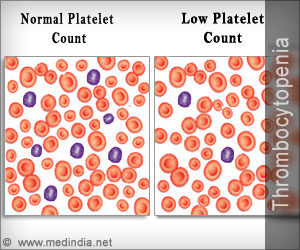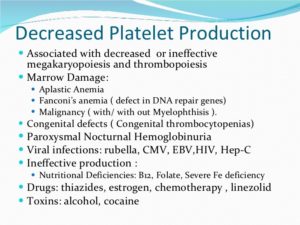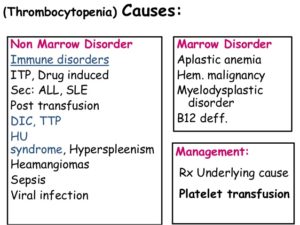Treatment:
There are a lot of treatment options for thrombocytopenia and ITP. You’ll need to work with your doctor to weigh the pros and cons of each and find a therapy that’s right for you.
If you have ITP, your treatment depends on how severe a case you have. If it’s mild, you may only need to get regular checks of your platelet levels.
When you do need treatment, the goal is to get your platelet count to a level that’s high enough to prevent serious bleeding in the gut or brain.
Your doctor will likely suggest these treatments for ITP first:
Corticosteroids. Dexamethasone or prednisone is typically prescribed to raise your platelet count. You take it once a day in the form of a pill or tablet. An increased or normalized platelet count is generally seen within two weeks of therapy, particularly with high-dose dexamethasone. Your doctor will then likely gradually reduce your dose over the next 4 to 8 weeks. The treatment may have to be repeated, but once your platelet count is normalized, none is needed again.
There are some side effects to prednisone, especially if you use it for a long time. Even after a short time, you can get irritable, have stomach upsets, and have other problems such as:
- Sleep problems
- Weight gain
- Puffy cheeks
- Frequent urination
- Lower bone density
- Acne
Besides side effects, another disadvantage to prednisone is that your platelet count may drop once you’ve finished your treatment.
IVIG (intravenous immune globulin). If you can’t get your platelet count up with prednisone, if you cannot tolerate steroids, or if your count drops after you’re done with your treatment, your doctor may suggest IVIG. You take this medication through an IV, usually for several hours a day over a period of 1 to 5 days.
- Nausea and vomiting
- Headaches
- Fever, chills
Surgery. If you have ITP and other treatments haven’t raised your platelet levels enough, you may benefit from an operation to remove your spleen. That’s the organ that destroys your platelets, so taking it out can give your platelet count a boost. But this doesn’t always work.
Getting your spleen removed can make it harder for you to fight infections. Your infection risk is greatest in the first 3 months after your surgery.
Rituximab (Rituxan). This drug is a type of treatment known as biologic therapy. It attacks B cells, a type of white blood cell that can destroy platelets. It’s sometimes used if you have severe ITP despite treatment with steroids and you aren’t able to have surgery to remove your spleen. Your doctor may also suggest it if you’ve had your spleen removed but you still have low platelet counts.
Side effects for rituximab include:
- Fever
- Chills
- Weakness
- Nausea
- Headaches
- Weakened immune system
Rho(D) immune globulin. This treatment, which you also take through an IV, is an alternative to traditional IVIG in patients who have Rh+ blood. It generally takes less than half an hour. The side effects are similar to IVIG.
If corticosteroids, IVIG, and Rho D aren’t improving your platelet count and you’re having bleeding problems, your doctor may switch to a second set of options. There are pros and cons for each. They include:
Thrombopoietin (TPO) receptor agonists. These drugs are also called platelet growth factors. If you have severely low platelets even after treatment with steroids, surgery to remove the spleen, or rituximab, you will likely do well on these medicines, but you may need to take them long-term.
A TPO drug may also be used in a patient who requires an increase in platelet count for a period of time, such as during an acute bleeding episode, in preparation for elective surgery, or while deciding about, planning, or awaiting a splenectomy.
If you’ve tried those and still can’t get your platelet count to the right level, your doctor may suggest these medicines:
A newer drug called Fostamatinib (Tavalisse), a spleen tyrosine kinase inhibitor, is designed to treat thrombocytopenia in adults with chronic ITP who haven’t responded to previous treatment. The initial dose is a pill twice a day.
Immunosuppresants, such as azathioprine (Imuran), cyclosporine, and mycophenolate mofetil (CellCept). They work by keeping your immune system in check.
Androgens, such as danazol (Danocrine). It’s not used in women because it can cause unwanted hair growth called hirsutism.
Vinca alkaloids, such as vinblastine, vincristine (Vincasar), and rarely, cyclophosphamide (Cytoxan). Doctors sometimes suggest these if you’re having severe bleeding and your platelet count isn’t getting a boost from other treatments.
Taking Care of Yourself
You can still do a lot of things, but you may need to make some changes to your lifestyle to prevent getting hurt or cut. For instance, avoid sports such as football and downhill skiing.
Eat a healthy diet with lots of fruits and vegetables, especially leafy greens, to give your body the nutrients it needs. Ask your doctor if you should avoid food with quinine and aspartame, like tonic water, bitter lemon, bitter melon, some diet sodas, and sugar-free foods.
You shouldn’t take medicines that make bleeding easier, such as aspirin and ibuprofen.
Ask your doctor if it’s OK for you to drink alcohol, and if it is, how much.
What to Expect
Your case may be different from someone else’s. Your doctor will watch you to see how you’re doing. If your case is mild, you may not need any treatment. But even people who do need treatment can lead full lives.
Find out as much as you can about your condition so you can best manage it.
Getting Support
The Platelet Disorder Support Association has information about ITP and ways to connect with others who also have it.


